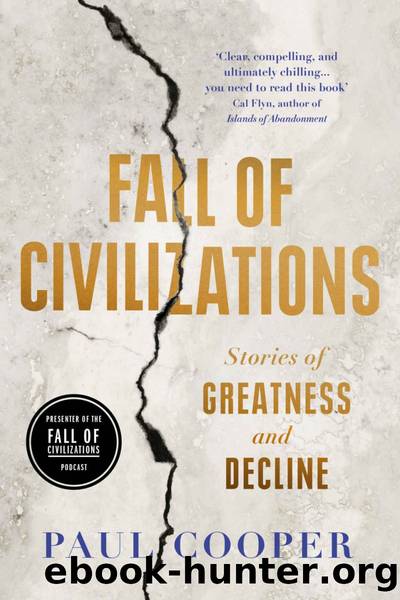Fall of Civilizations: Stories of Greatness and Decline by Paul Cooper

Author:Paul Cooper [Paul Cooper]
Language: eng
Format: epub
Tags: History, Adult
ISBN: 9780715655016
Amazon: B0CN5NWPLC
Goodreads: 202116564
Publisher: Duckworth Books
Published: 2024-03-31T23:00:00+00:00
Figure 36. Attack of the Crusaders on Constantinople â miniature in a Venetian manuscript, c. 1330.
The crusaders sailed into the port of Constantinople, and Alexios Angelos was crowned Emperor of the Romans on 1 August 1203. Sir Hugh, writing to the Pope and trying his best to make his conquest of Constantinople look like it had been a good idea, reassured him of Angelosâs promises:
Our new emperor, with everything that he had promised us fully and completely rendered, bound himself to us by oath to cross the sea with us in next Marchâs voyage, accompanied by ten thousand soldiers, and to provide food for one year to the entire army of the Lord.21
The actual situation was much different. When the previous emperor fled the city, he had taken with him more than 1,000 pounds of gold and some priceless jewels, leaving the imperial treasury drastically depleted. Clearly getting a little nervous about his new friends, Alexios gave leave for the Latin soldiers to take any priceless works of Byzantine art that they could find in the cityâs churches, outraging the cityâs people. These artefacts were destroyed and their gold melted down â but even then, Angelos barely made a dent in the sum he had promised the Latin warriors.
Riots broke out in the city, and, frustrated by their inability to fight with Muslims in the holy land, the crusaders began destroying Constantinopleâs mosques instead. But the city had not earned its reputation as âthe refuge of strangersâ for nothing: its residents came out in force to protect their Muslim neighbours. In retaliation, the crusaders set the city ablaze, and the riots soon spiralled into a full-blown revolution against the new emperor Alexios. He was swiftly overthrown by a rebel leader named Doukas, and strangled in early February 1204.
The crusaders demanded that this new Emperor Doukas honour the debt that had been promised to them. When he refused, they embarked on a campaign of revenge and destruction that saw the city ravaged over three days of blood and fire. The crusaders systematically violated the cityâs holy sanctuaries, destroying or stealing all they could lay hands on. Thousands of Constantinopleâs civilian population were massacred. The famous bronze horses from the Hippodrome were torn down and sent back to adorn the facade of St Markâs Basilica in Venice, where they remain to this day. Other statues were melted down to make bronze coins, about which Niketas Choniates quips: âThus great things were exchanged for small ones.â22
Declaring a victory for Christendom, the crusaders selected a new emperor from among their own ranks, and divided the territory of the Byzantine Empire into various new crusader states. What followed was a period of Latin rule in Constantinople which lasted for the next sixty years or so â but the Latins soon found that governing this large and fractious empire was no easy matter. They lost one territory after another, until what was now called the Latin Empire was reduced to no more than the city of Constantinople.
Download
This site does not store any files on its server. We only index and link to content provided by other sites. Please contact the content providers to delete copyright contents if any and email us, we'll remove relevant links or contents immediately.
| Civilization & Culture | Expeditions & Discoveries |
| Jewish | Maritime History & Piracy |
| Religious | Slavery & Emancipation |
| Women in History |
Cecilia; Or, Memoirs of an Heiress — Volume 1 by Fanny Burney(32544)
Cecilia; Or, Memoirs of an Heiress — Volume 2 by Fanny Burney(31942)
Cecilia; Or, Memoirs of an Heiress — Volume 3 by Fanny Burney(31929)
The Secret History by Donna Tartt(19048)
Sapiens: A Brief History of Humankind by Yuval Noah Harari(14366)
Leonardo da Vinci by Walter Isaacson(13315)
The Radium Girls by Kate Moore(12017)
Sapiens by Yuval Noah Harari(5365)
How Democracies Die by Steven Levitsky & Daniel Ziblatt(5213)
The Wind in My Hair by Masih Alinejad(5091)
Homo Deus: A Brief History of Tomorrow by Yuval Noah Harari(4906)
Endurance: Shackleton's Incredible Voyage by Alfred Lansing(4769)
Man's Search for Meaning by Viktor Frankl(4580)
The Silk Roads by Peter Frankopan(4525)
Millionaire: The Philanderer, Gambler, and Duelist Who Invented Modern Finance by Janet Gleeson(4465)
The Rape of Nanking by Iris Chang(4202)
Joan of Arc by Mary Gordon(4099)
The Motorcycle Diaries by Ernesto Che Guevara(4089)
Stalin by Stephen Kotkin(3956)
